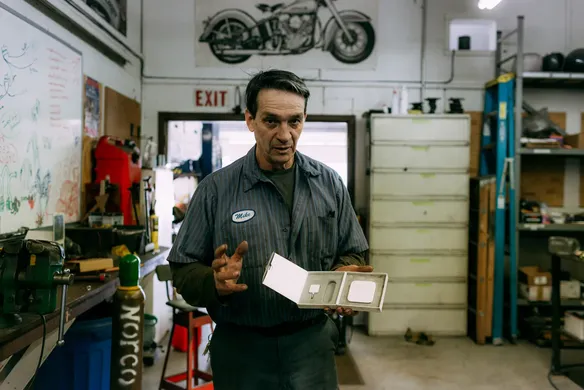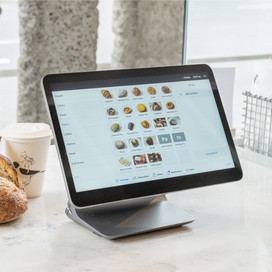Table of contents
Are you a fan of all things automotive? Do you want to turn that interest into a full-time career? Do you have an entrepreneurial mindset? If the answer to these questions is yes, yes and yes, it might be time to consider starting a mechanic business.
Mechanics provide all-important vehicle maintenance, repairs and custom installations to businesses and members of the public. Cars, trucks, motorbikes and other vehicles can be particularly dangerous if not properly maintained, so this is a business that comes with a lot of responsibility. That said, the opportunity to work in an area you find fun and that you’re genuinely passionate about can be an alluring prospect for entrepreneurs.
If you’re considering this path, the question then becomes how to start your own mechanic shop – which is exactly what we’ll be answering below.
Owning a mechanic shop vs a mobile mechanic business
Before we dive into how to start an auto repair shop, we should first consider whether you need a shop at all.
Mechanic businesses can be grouped into two categories: garages and mobile mechanics. If you own a garage or workshop, your customers come to you. If you own a mobile mechanic business, you go to your customers.
Garages and workshops have higher costs – renting a workspace obviously costs more than leasing a vehicle – but they also have greater earning potential. You can work on multiple cars at once, you can employ more mechanics, and you can invest in tools that can handle a wider variety of work and make that work far more efficient.
Mobile mechanic businesses have their perks, like the ability to largely set your own schedule and the freedom of life on the road. The path you choose will be an entirely personal decision, though in this article we’ll focus on how to open a mechanic shop or garage, so some of the below may not apply if you choose to go mobile.
Requirements to start a mechanic shop
What skills, qualifications, permits and licences will you need to start your mechanic business? Let’s take a look at the main considerations.
Mechanic qualification
Every mechanic business must have at least one certified mechanic. There are four main mechanic courses in Australia, each of which takes 12-24 months to complete:
- Light vehicle: The general mechanic qualification.
- Heavy diesel or commercial: The commercial and heavy machinery mechanic qualification.
- Automotive electrical: Covering all things electronic in a vehicle.
- Automotive panel beating: A repair-specific qualification.
A number of other qualifications are required for more specific work, such as examining second-hand vehicles, modifying vehicles and installing gas systems.
Motor vehicle repairer’s licence
On top of these qualifications, all states except Victoria require the mechanic shop owner to hold a motor vehicle repairer’s licence, which lasts for three years. The authorities in charge of distributing these licences change from state to state, but the links to each can be found below:
Business registration
Like any business owner, you’ll need to register your enterprise by obtaining an Australian Business Number (ABN) or an Australian Company Number (ACN). Because a company structure will help you to shield yourself from liabilities associated with your business, most mechanic shop owners will obtain an ACN.
A garage or workspace
The final requirement is space to do your work! Vehicle maintenance and repair requires a unique space – ideally one that is built for the purpose. You’ll need plenty of room to fit vehicles, good ceiling clearance and ideally a vehicle inspection pit or two (although you can alternatively invest in a car hoist.)
Well-designed garages don’t come up for lease often and are very expensive to build or buy, so this can form a major hurdle for those considering starting their own shop.
Insurance for an auto mechanic business
Insurance is a key consideration in a mechanic business, as working in the automotive industry brings inherent risk. You need to think about public liability, worker injuries, equipment damage, theft, fire, and a wealth of other potential issues.
Many insurers offer motor trades-specific coverage, which tends to insure against the following:
- Product and public liability to guard against negligence resulting in property damage or personal injury.
- Fire, flood and other adverse events.
- Theft of money, vehicles or equipment.
- Damage to your shop, vehicles or equipment.
Essential equipment needed to start a mechanic shop
Speaking of equipment, what gear do you need to buy to kit out your new business? The answer will depend on the type of work you plan to undertake, but here is a basic list:
- Power tools: Drills, grinders, saws, lathes, air compressors, welding equipment.
- Hand tools: Spanners, screwdrivers, pliers, ratchets, jacks.
- Diagnostic tools: Pressure gauges, micrometers, electronic diagnostic equipment.
- Office tools: Computers, printers, scanners, phones, business software.
Market your business
Qualified, insured and equipped, it’s time for you to open. But the automotive industry is competitive, so you’ll have to conduct some savvy marketing in order to get customers through your garage doors:
- Create a website: Every business needs a website if they are to have any chance of success. The best, like those created with Square Online, will sell your services, take bookings and payments, and make you far more Googleable.
- Set up social profiles: People trust people, which is what makes social media such a powerful marketing tool. Set up profiles across the main platforms, post regularly, engage with your audience, and encourage people to leave reviews!
- Use word of mouth: It might feel old fashioned, but word of mouth continues to be the most effective form of marketing there is. Encourage people to tell their friends and family about your business, and consider offering a discount or other incentive to those who do.
How much can you charge customers?
How much will you charge for your services? Mechanics make money in two main ways: through labour and through mark-ups on products and parts. Your rates should be set at a level that customers feel is fair, but that also ensures you can cover your costs comfortably – which means that an inner-city mechanic will generally charge more than a country mechanic.
An hourly rate of $70-$120 is around the mark for most independent mechanics, though what you charge is up to you.
Payment solutions for automotive businesses
- POS system: A point of sale (POS) system is critical for a mechanic who takes payments in their shop. In Square POS you have a system capable of doing more than taking payments, as it offers loyalty rewards, tracks cash flow, and even manages your team.
- EFTPOS machine: Don’t need all the functionality listed above? Square Terminal is an EFTPOS machine that accepts card and contactless payments instantly, securely and cost-effectively.
- Portable credit card reader: Want the most compact of payment solutions? Look no further than Square Reader, which plugs straight into your phone and accepts payments through an app!
- Invoicing: As a mechanic, you’ll need to be able to produce professional quotes and tax invoices, tasks made super simple by Square Invoices.
That, in basic terms, is how you start a mechanic business – what you do with this information is entirely up to you. If you decide to take the leap into the automotive world, know that Square will be there with all the tech you need to make your new venture as smooth and enjoyable as possible.
![]()











